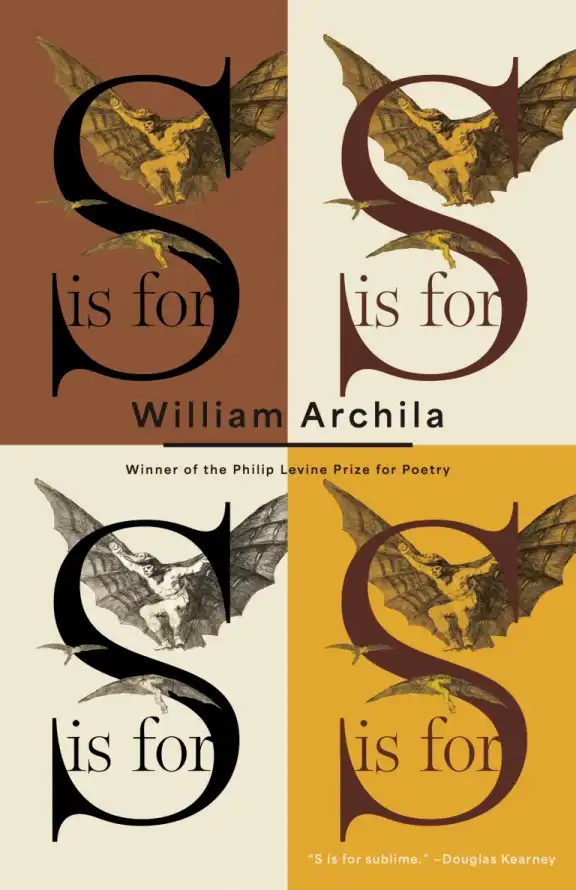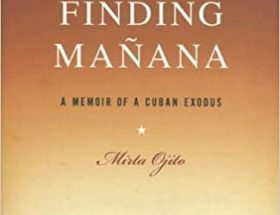
Archila’s Hauntings: Book Review of S is For
William Archila is the winner of the 2023 Philip Levine Prize for Poetry for his collection S is For. His first collection, The Art of Exile, was awarded the International Latino Book Award, an Emerging Writer Fellowship Award from the Writer’s Center and was selected for The Fifth Annual Debut Poets Round Up” in Poets & Writers. The Gravedigger’s Archaeology, Archila’s second book, received the Letras Latinas/Red Hen Poetry Prize. He has been awarded the Alan Collins Scholarship from the Bread Loaf Writers’ Conference and the Fighting Fund Fellow Award from the University of Oregon. He was also awarded the 2023 Jack Hazard fellowship.

I have to admit, I have rarely felt as excited about an author’s upcoming third book as I did about William Archila’s S is For. When I heard that his poetry collection had won the Philip Levine Prize for Poetry, I marked the publication date on my calendar. Archila’s first book, The Art of Exile (Bilingual Press, 2009), was one of the first poetry books I read that made me feel the horror of the Salvadoran Civil War. The Gravedigger’s Archaeology (Red Hen Press, 2015) was a lyrical vigil that left me wanting more. They were both great books, but S is For is a crowning achievement that does not disappoint.
This collection is haunting in so many ways. Sometimes the message of the consequences of war is subtle and sometimes it is sublime, but it is in just about every poem in a manner that reminds the reader that when war ends, as it did in El Salvador in 1992, and as it did in other Central American countries, the horrors do not. Those memories cling to the earth, to songs, to plays, to landscapes, to trees, to the language, and to so many other day-to-day actions and objects that residents and exiles encounter. “City of” captures this sentiment: “City of ghosts. City of dead cars. City of nah to the songs / that say blah, blah, blah. Is this what I get / when my father’s dead. Is this what I get when I’m lonely” (1-3). The portrait that remains is startling but necessary, particularly in a country such as the U.S. with a penchant for forgetting conflicts.
Throughout this collection, Archila demonstrates an impressive range of skills as a poet. Stylistically, there is no doubt that Archila has mastered the craft. For example, from the first poem, “Beyond Bruegel’s Shore,” inspired by Pieter the Elder Bruegel’s “Landscape with the Fall of Icarus,” to “Saturn’s Country,” inspired by Francisco Goya’s “Saturn Devours his Children,” Archila weaves allusions to art in the form of paintings, sculptures, songs, and literature, in a way that makes you want to study past works.
Blink Subscription Plus Plan with monthly auto-renewal
$11.99 (as of November 16, 2025 07:02 GMT -05:00 – More infoProduct prices and availability are accurate as of the date/time indicated and are subject to change. Any price and availability information displayed on [relevant Amazon Site(s), as applicable] at the time of purchase will apply to the purchase of this product.)Apple AirPods 4 Wireless Earbuds, Bluetooth Headphones, Personalized Spatial Audio, Sweat and Water Resistant, USB-C Charging Case, H2 Chip, Up to 30 Hours of Battery Life, Effortless Setup for iPhone
$84.99 (as of November 16, 2025 07:02 GMT -05:00 – More infoProduct prices and availability are accurate as of the date/time indicated and are subject to change. Any price and availability information displayed on [relevant Amazon Site(s), as applicable] at the time of purchase will apply to the purchase of this product.)Apple EarPods Headphones with USB-C Plug, Wired Ear Buds with Built-in Remote to Control Music, Phone Calls, and Volume
$16.99 (as of November 16, 2025 07:02 GMT -05:00 – More infoProduct prices and availability are accurate as of the date/time indicated and are subject to change. Any price and availability information displayed on [relevant Amazon Site(s), as applicable] at the time of purchase will apply to the purchase of this product.)Apple AirTag. Keep Track of and find Your Keys, Wallet, Luggage, Backpack, and More. Simple one-tap Set up with iPhone or iPad
$18.00 (as of November 16, 2025 07:02 GMT -05:00 – More infoProduct prices and availability are accurate as of the date/time indicated and are subject to change. Any price and availability information displayed on [relevant Amazon Site(s), as applicable] at the time of purchase will apply to the purchase of this product.)Amazon Fire TV Stick HD (newest model), free and live TV, Alexa Voice Remote, smart home controls, HD streaming
$17.99 (as of November 16, 2025 07:02 GMT -05:00 – More infoProduct prices and availability are accurate as of the date/time indicated and are subject to change. Any price and availability information displayed on [relevant Amazon Site(s), as applicable] at the time of purchase will apply to the purchase of this product.)I would be remiss if I did not mention that when the Los Angeles Times published an article in 2023 claiming to describe how a Salvadoran diaspora contributed to the evolution and success of Salvadoran-American Literature in the U.S., it did what the U.S. literary establishment has done to marginalized writers for decades. It erased the history of a number of Salvadoran authors who may not have kicked doors open but certainly unlocked them. Archila is one of those writers who was ignored due to either someone’s sloppy research or due to their myopic urge to celebrate a select few. Whatever the case, Archila has earned not only the right to be mentioned among the titans of Salvadoran-American literature but also among the great poets of our time. His first two collections proved that, and S is For confirms that.














